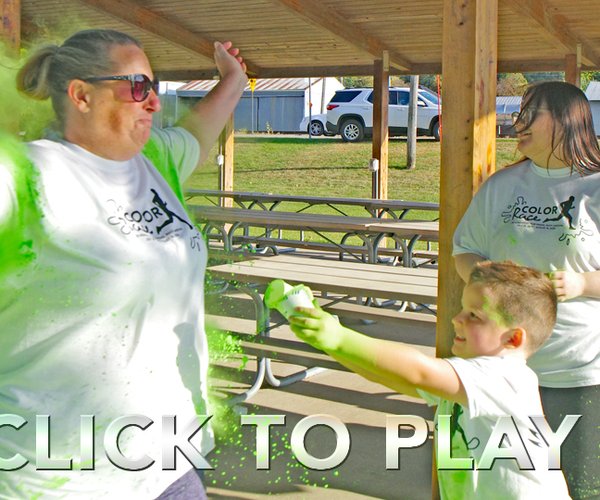For those low-income residents of the Boscobel area with severe dental problems, help has arrived.
On Aug. 19, the InHealth Community Wellness Clinic's Adult Dental Extraction Program opened in Boscobel.
Its mission is to treat adults who had Medicaid, Medicare, or no insurance whatsoever.
"Our major goal is to help people who really become sick because they have teeth that need to be extracted," said InHealth's Robin Transo.
Seeing patients on Day 1, the new dental program conducted 17 extractions. In all, 10 patients were sched-uled to have work done, with one no-show.
Officials associated with the program want to take a hard line with those who fail to show up for appointments.
"That (no-show) jeopardized someone else getting help," said Robin. "I've been researching programs like this for three years, and I've worked closely with Jefferson County, who has tried dental clinics for the last three years and if there is a no-show, they will never see that patient again."
Such drastic measures haven't been taken as of yet with Boscobel's new program, but actions like that one may become necessary later.
In the future, too, organizers hope to be able to add restorative dentistry to the list of services the new dental program provides.
To get the program up and running, it needed a few essential items, one being a dentist.
Last year, Robin went camping near the Lac du Flambeau Indian reservation. Realizing she was close to where one of her friends lived, Robin went for a visit.
While there, she was introduced to Dr. Kamyer Saeian, from Milwaukee. At first, Robin didn't know he was a dentist. As they talked, she found out he was and had been going to South Dakota Indian reser-vations to perform dental services with that popula-tion.
"I told him I had a free clinic and that we wanted to get a dental program," said Robin. "He said, ‘I could certainly come and help you out.'"
With a dentist onboard, organizers needed to generate funding for the idea to become reality.
"Thanks to three major donors, we raised $35,000 to get the program started," said Robin.
The next step involved planning, and that's where Dental Associates from Prairie du Chien came in.
"They made out a wish list of everything we could possibly need to extract teeth," said Robin.
A major item was a new dental x-ray machine, which cost around $6,000. Along with that, organizers needed a computer to plug in information gleaned from those x-rays, plus a $7,000 mouth sensor.
And then, there was the matter of finding a space for the program. Robin's hus-band, Poul-Erik Transo, of the Associated Balance and Hearing Clinic, donated an area in his clinic and a computer for the dental ex-traction program.
"He knew how important it was," said Robin. "He works in the free clinic, and we get people who have real health problems from years of infected teeth. That affects the heart and other organs."
How it all started
Clearly, the dental program will be associated with the free clinic, as Robin explains.
"Under the In-Health umbrella, people are referred to the adult dental extraction clinic," said Robin.
Established in 2007, the InHealth free clinic has "grown by leaps and bounds," according to Robin.
"It started out as a primary health care facility, and we came then to find out that we needed to get into preventive dentistry," said Robin.
Of special importance was the treatment of children.
However, the problem, according to Robin, is that few dentists in Grant and Crawford counties take BadgerCare or Medicare.
So, organizers were able to convince a dental assistant to come in and do teeth cleanings. Funds were raised through the local thrift shop associated with InHealth.
The program has been so successful that now it ex-panded to include two hygienists. Furthermore, it is expanding into Iowa County.
"It's been really successful," said Robin. "We've been seeing fewer and fewer children with extreme needs."
Other projects associated with the free clinic include safe house projects, growing tomatoes for food pan-tries and outreach to assist area homeless organizations.
As far as the free clinic itself goes, it has its own pharmacy and Robin said that every time it opens, it gets at least five new patients. With eight or nine volunteers working when it's open, the free clinic has been known to serve as many as 30 people in a three-hour period.
"It's got to run like clockwork," said Robin. "Word is getting out about it."
Surely, word is also going to get out about the dental extraction program.
To get services, prospective patients will need to first go to the free clinic to get checked out.
If a patient needs to get teeth extracted, that person will be referred by the free clinic to the dental program.
"Then, they have to be on antibiotics four to five days prior to extraction," said Robin. "We can set it up for them to get the medicine. They can come in three weeks ahead of time to get it if they want."
But, she stresses, they have to be taking it four to five days ahead of time.
Right now, the cost is $30 a tooth for extraction. If they get more three or more teeth extracted, the cost changes.
On opening day, the dentist saw a patient every half hour. To meet demand, the program is looking for more dentists. But, as of right now, all involved are pleased with the operation.
"We're happy, (the dentist) is happy, the patients are happy - it's a win, win, win," said Robin.
Free Clinic debuts adult dental program





